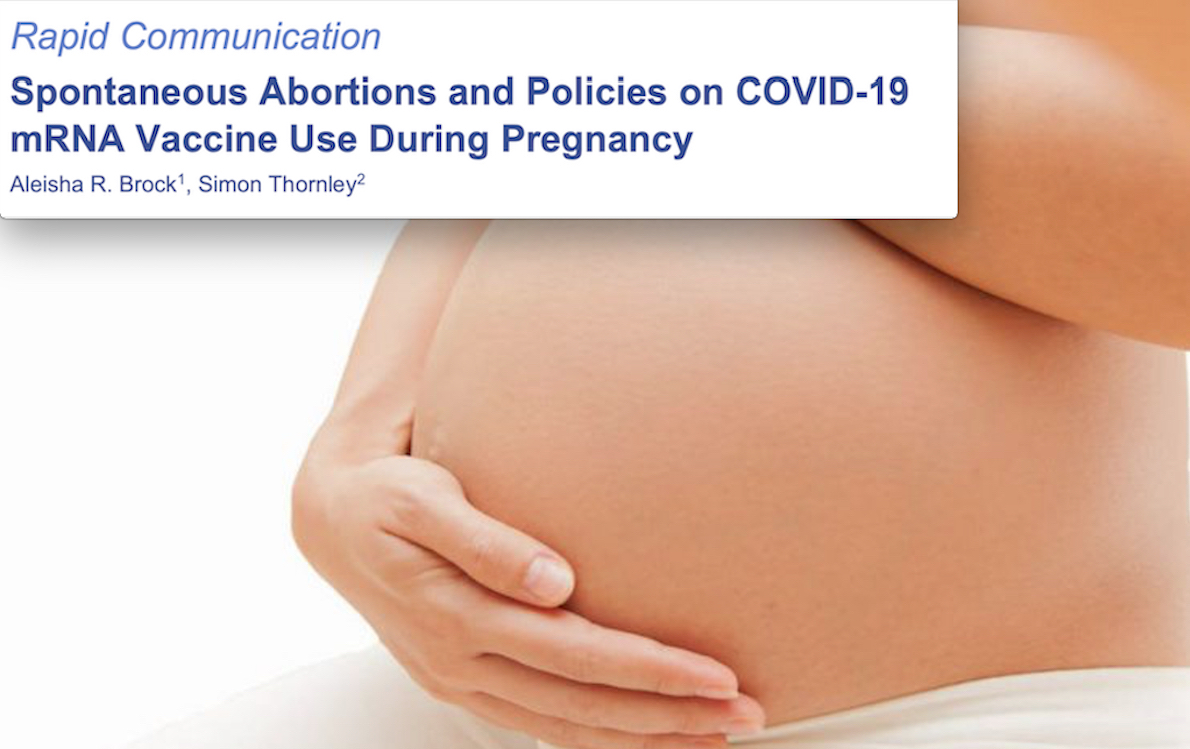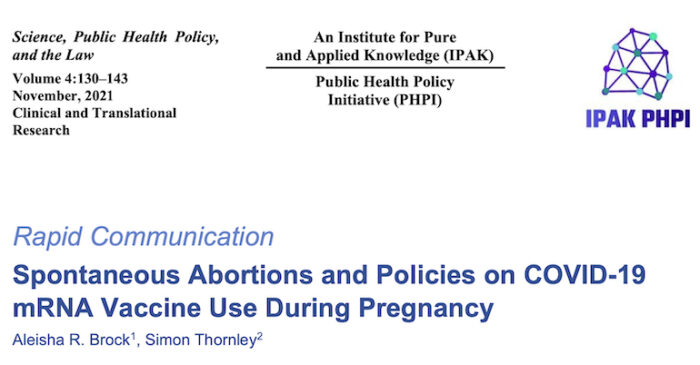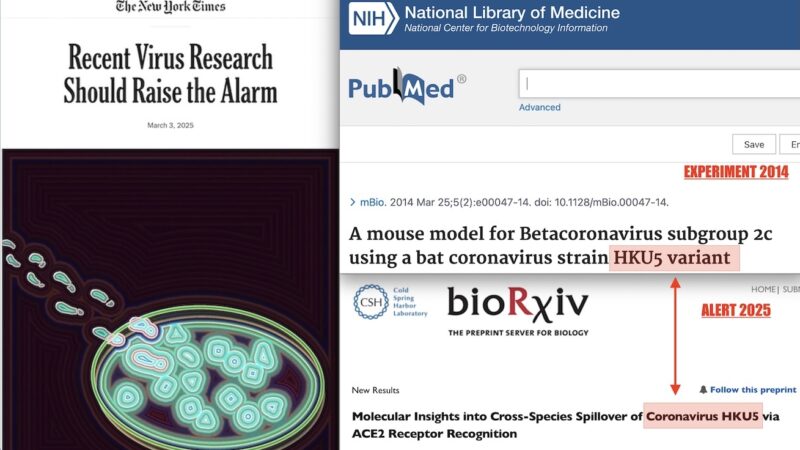“Risks of Miscarriage from mRNA Vaccines”. New Zealand Scientists wrote in a Research: “Stop Gene Serums for Pregnant Women and Babies”

Versione in ItalianoAll Italian links can be read in English with Machine Translation
The Devil makes the pots but not the lid! A few hours after the American CDC approved the experimental gene sera based on messenger RNA for children aged 5 and above (amid the scandal that a member of the Advisory Committee of approval was previously funded by the Big Pharma GSK, a Pfizer partner, published by Gospa News in Italian web section) comes to light an already revised study in which two scientists sound the alarm about the risk of miscarriages for pregnant women and ask for the withdrawal of vaccines for them as for breastfeeding mothers, but also for the children.
https://www.gospanews.net/2021/11/04/usa-scandalo-vaccini-covid-ai-bimbi-da-gsk-socia-di-pfizer-18mila-a-medico-del-comitato-cdc-che-ha-dato-ok-e-ricercatore-di-fauci/
The research was led by Aleisha Brock Ph.D., MVS, BSc. Whanganui, New Zealand, and Simon Thornley Ph.D., MPH (Hons), MBChB. Senior Lecturer, Section of Epidemiology and Biostatistics, The University of Auckland, New Zealand, and then published in the New Zealand specialist journal of “An Institute for Pure and Applied Knowledge (IPAK) – Public Health Policy Initiative (PHPI)”. Here are the essential parts in the summary and conclusions of the two researchers.

The use of mRNA vaccines in pregnancy is now generally considered safe for protection against COVID-19 in countries such as New Zealand, USA, and Australia. However, the influential CDC- sponsored article by Shimabukuro et al. (2021) used to support this idea, on closer inspection, provides little assurance, particularly for those exposed in early pregnancy.
The study presents falsely reassuring statistics related to the risk of spontaneous abortion in early pregnancy, since the majority of women in the calculation were exposed to the mRNA product after the outcome period was defined (20 weeks’ gestation).In this article, we draw attention to these errors and recalculate the risk of this outcome based on the cohort that was exposed to the vaccine before 20 weeks’ gestation.
Our re-analysis indicates a cumulative incidence of spontaneous abortion 7 to 8 times higher than the original authors’ results (p < 0.001) and the typical average for pregnancy loss during this time period. In light of these findings, key policy decisions have been made using unreliable and questionable data. We conclude that the claims made using these data on the safety of exposure of women in early pregnancy to mRNA-based vaccines to prevent COVID-19 are unwarranted and recommend that those policy decisions be revisited.
https://www.gospanews.net/2021/10/14/sars-cov-2-e-vaccini-modificano-il-dna-umano-enorme-esperimento-sulla-popolazione-studio-incubo-di-genetista-tedesco-su-science-direct/
We question the conclusions of the Shimabukuro et al.[4] study to support the use of the mRNA vaccine in early pregnancy, which has now been hastily incorporated into many international guidelines for vaccine use, including in New Zealand. The assumption that exposure in the third trimester cohort is representative of the effect of exposure throughout pregnancy is questionable and ignores past experience with drugs such as thalidomide.
Evidence of safety of the product when used in the first and second trimesters cannot be established until these cohorts have been followed to at least the perinatal period or long-term safety determined for any of the babies born to mothers inoculated during pregnancy. Additionally, the product’s manufacturer, Pfizer, contradicts these assurances, stating: “available data on Comirnaty administered to pregnant women are insufficient to inform vaccine- associated risks in pregnancy”, and “it is not known whether Comirnaty is excreted in human milk” as “data are not available to assess the effects of Comirnaty on the breastfed infant” (page 14).
Due to the nature of the mRNA vaccine roll-out, healthcare providers need to report any issues in pregnancy to further determine the safety of this product. Caution should be exercised in the administration of vaccines in pregnancy, as indicated by the possible association between the exposure to influenza vaccines containing H1N1pdm09 (2010–11 and 2011–12) and spontaneous abortion.
Considering the evidence presented here, we suggest the immediate withdrawal of mRNA vaccine use in pregnancy (Category X)[41] and those breastfeeding, alongside the withdrawal of mRNA vaccines to children or those of child-bearing age in the general population, until more convincing data relating to the safety and long-term impacts on fertility, pregnancy and reproduction are established in these groups.
Editor’s Note 1: This report was peer-reviewed by reviewers not affiliated with the authors. The process was single-blinded (the authors do not know who the reviewers are).
https://www.gospanews.net/en/2021/10/13/heart-attacks-risk-for-covid-vaccinated-pilots-must-not-fly-us-air-force-medical-officer-wistleblower-also-denounces-toxic-substances-in-vaccines/
Editor’s Note 2: On June 24, 2021, Dr. Shimabukuro also presented data from the Vaccine Safety Datalink to the US Advisory Committee on Immunization Practices (ACIP) and concluded that the system captured no (zero) serious adverse events or deaths that could be attributed to the COVID-19 vaccine. On June 10, 2021, Dr. Shimabukuro reported no increased risk of myocarditis using data from the VSD to the Vaccines and Related Biological Products Advisory Committee (VRBPAC). Soon after these presentations, US FDA issued an advisory on the risk of myocarditis and pericarditis from the Pfizer/Biontech Bnt162b2/Comirnaty vaccine. The information present to ACIP was critical in their decision on vaccine recommendations. I have addressed the absence of and failure of “pharmacovigilance” in a recent Editorial in this journal.
Source IPAK PHPI review



